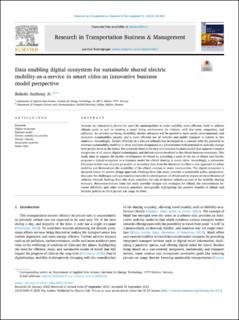Data enabling digital ecosystem for sustainable shared electric mobility-as-a-service in smart cities-an innovative business model perspective
Peer reviewed, Journal article
Published version
Permanent lenke
https://hdl.handle.net/11250/3096186Utgivelsesdato
2023Metadata
Vis full innførselSamlinger
Originalversjon
Research in Transportation Business and Management. 2023, 51, Artikkel 101043. 10.1016/j.rtbm.2023.101043Sammendrag
Increase in urbanization drives the need for municipalities to make mobility more efficient, both to address climate goals as well as creating a smart living environment for citizens, with less noise congestion, and pollution. As vehicles are being electrified, further advances will be needed to meet social, environmental, and economic sustainability targets, and a more efficient use of vehicles and public transport is central in this endeavor. Accordingly, Electric Mobility as a Service (eMaaS) has developed as a concept with the potential to increase sustainability mobility in cities and been designated as a phenomenon with potential to radically change how people move in the future. But presently there is the lack of a common business model that supports complex integration of all actors, digital technologies, and infrastructures involved in the eMaaS business ecosystem. This study aims to support the further development of eMaaS by providing a state of the art of eMaaS and further proposes a digital ecosystem as a business model for eMaaS sharing in smart cities. Accordingly, a systematic literature review was adopted grounded on secondary data from the literature to offers a new approach to urban mobility and demonstrate the suitability of the eMaaS concept in smart communities. The digital ecosystem is designed based on system design approach. Findings from this study provides a sustainable policy perspective, discusses the challenges and opportunities towards the development of eMaaS and its impact on electrification of vehicles. Overall, findings from this study considers the role of electric vehicles as part of the mobility sharing economy. Recommendations from this study provides designs and strategies for eMaaS, the interrelations between eMobility and other everyday practices, strategically highlighting the positive benefits of eMaaS and broader policies to limit private car usage in cities.

